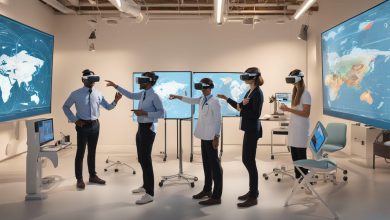
Artificial intelligence (AI) has become a game changer in the field of healthcare. It is transforming the way we diagnose and treat patients, and improving overall patient care. With the help of AI, healthcare professionals can analyze vast amounts of data to gain insights that were previously unavailable.
AI algorithms and machine learning are being integrated into healthcare processes to improve decision-making and provide personalized treatment plans for patients. It is not only making the patient experience better, but it is also increasing the efficiency of healthcare systems.
Key Takeaways:
- AI technology is revolutionizing the healthcare industry.
- AI is transforming diagnostics and improving patient care.
- AI-driven diagnostic processes lead to faster treatment and better patient outcomes.
- AI-powered technologies can improve patient monitoring and overall care management.
The Rising Influence of AI in Healthcare
Artificial Intelligence (AI) is transforming the healthcare industry by providing new opportunities to improve diagnostics and patient care. By leveraging machine learning and other AI technologies, healthcare providers can provide accurate, efficient and personalized care. AI-powered tools are being developed with the goal of improving patient outcomes, and they are already making a significant impact on healthcare services.
AI for diagnostics is already revolutionizing the healthcare industry. Machine learning algorithms are being used to more accurately diagnose conditions such as cancer and heart disease by analyzing medical images and other patient data. This allows doctors to make faster and more accurate diagnoses, which can lead to more effective treatment options and improved patient outcomes.
AI is also being used in patient care to provide personalized and optimized treatment plans. By analyzing patient data, AI algorithms can create customized treatment protocols that address each patient’s unique needs, preferences, and health profile. This reduces the risk of misdiagnoses and ensures that patients receive the best possible care.
AI for Diagnostics
AI is transforming diagnostics by providing new tools and insights that can enhance accuracy and speed. For example, Google’s DeepMind has developed an AI-powered system that can analyze medical images to detect early signs of eye disease. This system has been shown to be more accurate than human doctors in detecting diabetic retinopathy, a leading cause of blindness in adults.
Another example is the use of AI for early cancer diagnosis. The company Freenome has developed an AI-driven blood test that can detect early-stage cancer by analyzing changes in DNA. This non-invasive test has the potential to significantly increase early detection rates, which can lead to more effective treatment options and better patient outcomes.
AI in Patient Care
AI is also transforming patient care by providing personalized and optimized treatment plans. For example, AI-powered chatbots are being used to triage patients and provide personalized care recommendations. These chatbots can quickly assess patient symptoms and provide recommendations on care and treatment options.
AI is also being used to monitor patients remotely. Wearable devices equipped with AI algorithms can track vital signs and alert healthcare providers to potential issues before they become serious. This allows for early intervention and can help prevent readmissions and other costly healthcare events.
Overall, AI is becoming an increasingly important tool in healthcare. It has the potential to transform diagnostics and patient care, improving outcomes and reducing costs. However, there are also numerous challenges and ethical considerations associated with AI in healthcare that must be carefully considered. The benefits of AI in healthcare are clear, but it is essential to approach its implementation with care and caution to ensure that it is used ethically and effectively.
Transforming Diagnostics with AI
The use of AI in healthcare has revolutionized diagnostic processes, leading to faster and more accurate diagnoses. AI algorithms and machine learning have the potential to transform the healthcare industry, aiding in accurate and timely diagnosis, leading to faster treatment and improved patient outcomes. AI-driven diagnostics have disrupted traditional diagnostic methods, offering superior accuracy and efficiency.
With AI technology, medical professionals can automate routine tasks, allowing them more time to focus on patient care and reducing the risk of errors. AI has the potential to analyze large amounts of medical data and identify patterns, providing insights that can improve diagnosis and treatment plans.
| Examples of AI-driven Diagnostics | Benefits |
|---|---|
| AI-powered imaging analysis systems | Improved accuracy in detecting cancer and other diseases |
| AI-powered blood testing systems | More efficient and precise diagnosis of diseases and infections |
| AI-powered diagnostic software | Improved interpretation of patient data, leading to better diagnosis and treatment outcomes |
While AI-driven diagnostics offer significant benefits, there are also ethical considerations to be addressed. It is important to maintain data privacy and ensure algorithms are unbiased and free of discrimination. Additionally, healthcare professionals must maintain a level of human oversight to ensure that the AI-driven diagnoses are accurate and appropriate.
Overall, AI has the potential to transform diagnostic processes and improve patient outcomes. As the healthcare industry continues to adopt AI technology, we can expect to see more efficient and precise diagnosis and treatment processes, ultimately leading to a higher quality of patient care.
Enhancing Patient Care through AI
Artificial intelligence (AI) is transforming patient care by providing healthcare professionals with new tools to improve treatment outcomes and patient experience. AI-enabled patient care is making personalized treatment plans possible, enhancing patient monitoring, and improving overall care management.
One of the primary benefits of AI-enabled patient care is the ability to customize treatment plans based on specific patient needs. Using machine learning algorithms, healthcare professionals can analyze large amounts of data to identify patterns and create personalized care plans that are tailored to individual patients. This personalized approach can lead to better outcomes and faster recovery times.
AI is also transforming patient monitoring by enabling healthcare professionals to remotely monitor patients and detect early warning signs of potential health issues. This allows for proactive interventions, which can reduce the likelihood of hospitalization and improve patient outcomes. Additionally, AI can help healthcare professionals manage patient data more efficiently, reducing the risk of errors and improving care coordination.
Another area where AI is making a significant impact is in care management. By using advanced algorithms and predictive analytics, healthcare professionals can identify patients who are at risk of developing complications and proactively intervene to prevent adverse outcomes. This can result in reduced readmissions, reduced costs, and improved patient satisfaction.
AI-enabled patient care has the potential to revolutionize the healthcare industry by providing healthcare professionals with new tools to improve patient outcomes and experiences. As AI technology continues to evolve, it is likely that we will see even more advanced applications that can further enhance patient care and drive better healthcare outcomes.
Overcoming Challenges and Ethical Considerations
Despite the potential benefits of AI in healthcare, there are challenges and ethical considerations that must be addressed to ensure its successful integration and implementation. One of the primary concerns is the protection of patient privacy and data security. The use of AI in healthcare requires gathering and processing vast amounts of sensitive personal information, which must be safeguarded against unauthorized access or use. Proper cybersecurity protocols and data governance frameworks must be established to protect patient data.
Another issue is the potential for bias in AI algorithms that could lead to inequitable diagnoses or treatments. It is essential to ensure that AI systems are designed and trained on diverse and representative data sets to reduce the risk of bias and promote fairness in healthcare outcomes. Additionally, human oversight should be employed to monitor the performance of AI algorithms and ensure that they align with ethical and professional standards.
The integration of AI in healthcare also raises questions about the role of healthcare professionals in the delivery of care. While AI can support and augment the work of healthcare providers, it cannot replace the human touch and expertise. Therefore, it is crucial to ensure that healthcare professionals receive proper training and education to effectively collaborate with AI systems and deliver high-quality, patient-centered care.
In summary, while AI has the potential to revolutionize healthcare, it is essential to address the ethical and practical challenges associated with its integration. By prioritizing patient privacy and data security, reducing the risk of bias and promoting fairness, and supporting healthcare professionals in the delivery of care, we can harness the transformative potential of AI to improve healthcare outcomes and transform healthcare systems.
Future Possibilities and Potential Impact
The potential of AI in healthcare is vast, with promising possibilities for transforming diagnostics and patient care. As AI technology advances, there is a growing focus on developing intelligent algorithms that can learn from vast amounts of data to make more accurate and timely clinical decisions. This could lead to faster diagnoses and more effective treatment plans, ultimately improving patient outcomes.
Advancements in AI for Diagnostics
One promising area of AI in healthcare is the development of AI-driven diagnostics. By training algorithms on large volumes of medical imaging data, AI can assist in identifying abnormalities and potential health risks at early stages, allowing for quicker and more accurate diagnoses. This has the potential to transform traditional radiology and pathology practices, with AI-powered imaging and pathology technologies becoming more common.
Personalized Patient Care with AI
Another area where AI is transforming healthcare is in the field of personalized patient care. By analyzing vast amounts of clinical data and combining it with real-time patient monitoring, AI algorithms can create customized treatment plans tailored to the specific needs of each patient. This can lead to improved treatment outcomes, reduced healthcare costs, and better patient experiences.
The Human Factor in AI-Enabled Healthcare
Despite the potential benefits of AI, there are also concerns about the impact of AI on healthcare professionals and the role of human oversight in AI-driven healthcare systems. While AI algorithms can assist in making clinical decisions, they cannot replace the expertise and judgement of healthcare providers. Therefore, it is important to continue to prioritize the development and integration of AI tools that support, rather than replace, human healthcare professionals.
The Evolution of AI in Healthcare
Looking ahead, the possibilities for AI in healthcare are endless. Advancements in natural language processing and chatbot technology have already facilitated better communication between patients and healthcare providers, and there is potential for even more personalized and effective patient interactions. Additionally, the integration of AI with the Internet of Things (IoT) could lead to more efficient and streamlined patient monitoring and care management systems.
However, to realize the full potential of AI in healthcare, there is a need for ongoing investment in research and development, as well as a focus on addressing the challenges related to data privacy, bias, and ethical considerations. By doing so, we can ensure that AI is used to its full potential to revolutionize diagnostics and patient care, ultimately leading to better health outcomes for all.
Integrating AI into Healthcare Systems
The integration of AI into healthcare systems presents both opportunities and challenges. While AI technology has the potential to transform the way healthcare is delivered, there are also significant barriers to adoption that must be addressed.
One of the main challenges is the need for healthcare professionals to have the necessary skills and knowledge to effectively use AI technologies. This requires a significant investment in training and education, which can be costly and time-consuming.
Another challenge is the need for interoperability and standardization across different healthcare systems. This is critical for ensuring that AI technologies can be seamlessly integrated into existing workflows and systems.
Privacy and security concerns are also a major consideration when integrating AI into healthcare systems. Healthcare organizations must ensure that patient data is protected and that AI algorithms are free from bias and ethical issues.
Despite these challenges, the potential benefits of AI in healthcare are significant. AI technologies can help to improve patient outcomes, reduce costs, and enhance the overall quality of care. By addressing these challenges and working to integrate AI technologies into healthcare systems, we can create a more efficient and effective healthcare system that better serves patients.
Conclusion
Artificial intelligence is poised to revolutionize healthcare, transforming diagnostics and patient care in profound ways. As seen from the rising influence of AI in healthcare, this technology is already being used for diagnostics and patient care with examples of specific applications and benefits. Furthermore, the role of AI in transforming diagnostic processes cannot be overemphasized. AI algorithms and machine learning provide the necessary aid to make accurate and timely diagnoses that lead to faster treatment and improved patient outcomes.
AI-powered technologies are also enhancing patient care by improving patient monitoring and personalized treatment plans. This leads to better care management, resulting in better patient experiences and outcomes. However, ethical considerations such as data privacy and the need for human oversight in AI-driven healthcare systems cannot be ignored. Unaddressed, such issues could hinder the integration of AI into healthcare systems.
Looking forward, the future possibilities of AI in healthcare are vast. Emerging trends and advancements in AI technology could further transform diagnostics and patient care, significantly impacting healthcare professionals and the overall healthcare system. Careful consideration must be taken when integrating AI into existing healthcare systems, but with successful implementation, AI can greatly transform healthcare and significantly improve healthcare outcomes.
FAQ
Q: What is AI in healthcare?
A: AI in healthcare refers to the use of artificial intelligence technologies and algorithms in the healthcare industry to improve diagnostics and patient care.
Q: How is AI transforming diagnostics?
A: AI is revolutionizing diagnostics by using algorithms and machine learning to assist in accurate and timely diagnosis, leading to faster treatment and improved patient outcomes.
Q: What is the role of AI in patient care?
A: AI has the potential to enhance patient care by improving patient monitoring, enabling personalized treatment plans, and overall care management, resulting in better patient experiences and outcomes.
Q: What are the challenges and ethical considerations of AI in healthcare?
A: Integrating AI in healthcare raises concerns regarding data privacy, bias in algorithms, and the need for human oversight in AI-driven healthcare systems.
Q: How will AI impact the future of healthcare?
A: AI has the potential to further transform diagnostics and patient care in the future. Emerging trends and advancements in AI technology could greatly impact healthcare professionals and the overall healthcare system.
Q: What are the challenges in integrating AI into healthcare systems?
A: Integrating AI into existing healthcare systems comes with potential barriers to adoption. Strategies for successful implementation of AI technologies in healthcare settings need to be addressed.








